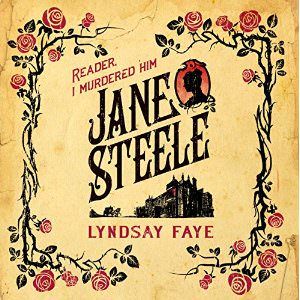“Reader. I murdered him.”
This is one of those books that would have passed me by had not one of my fellow reviewers at All About Romance picked it up and rated it highly. Her review and the book synopsis intrigued me and I’m glad I asked for a review copy of the audiobook, as Jane Steele proved to be a well-executed, intriguing and sometimes compelling listen that pays homage to one of the great literary classics, Jane Eyre.
This book is not, however, a retelling, re-imagining or one of those “here are the sexytimes the author would have written if she’d been able to” – versions of the original. There’s no question that Jane Steele – the book AND the character – is inspired by Charlotte Brontë’s classic, and that there are key moments and events during this book that relate directly back to the earlier novel; but this is ultimately a refreshing and somewhat unusual tale that very quickly takes on a life of its own.
The story opens when Jane is around nine years old and is living with her mother in a small cottage on the estate of Highgate House, the home of her aunt Patience Barbary and her cousin, the slimy, unpleasant Edwin. Jane’s mother has often insisted that one day, Highgate house will belong to Jane, although she has never explained the reasons that lie behind this belief. When Jane is orphaned, she ends up living with her sanctimonious relative, who, like Jane Eyre’s aunt, believes this Jane to be an undisciplined child with too passionate a nature. Unlike her namesake however, Jane Steele WANTS to be sent away to school – especially after she pushes cousin Edwin over a cliff and kills him when he tries to force his attentions upon her.
Jane’s time at Lowan Bridge is every bit as difficult as Jane Eyre’s at Lowood, and perhaps even worse as the headmaster is a truly sadistic and unpleasant man who inflicts horrible punishments upon girls who dare to break any of the rules. He holds a regular “reckoning” every day during which the girls are expected to snitch on their classmates, and given Jane’s independence and indomitable spirit, she receives her fair share of punishments. The tipping point, however, comes after some years, when her best friend Rebecca Clarke is being slowly starved to death and, when faced with the choice of staying at school to watch her die or allowing herself to be committed to an asylum, Jane snaps – and the headmaster becomes her second victim.
The girls flee to London, where Jane feels immediately at home:
Some cities bustle, some meander, I have read; London blazes, and it incinerates. London is the wolf’s maw. From the instant I arrived there, I loved every smouldering inch of it.
– and they eke out a living hawking, stealing, pickpocketing and swindling… or rather Jane does that while Becky takes up busking, singing in market places and on street corners. Lindsay Faye’s descriptions of London’s seedier side – the grubbiness, the narrow, dark streets, the smells and the downtrodden, scurrying people – are absolutely superb, and she really brings the place to life, painting a picture of both vibrancy and privation.
During the years spent in London, Jane’s homicidal skills are called upon a few more times, and yet the author still manages to keep listeners firmly in Jane’s corner and rooting for her. She’s an unusual and compelling character; a quick-witted survivor who doesn’t take crap from anyone but who nonetheless feels like a woman of her time, and what keeps her the right side of the listeners’ sympathies is that she’s motivated by love and loyalty. Her methods are unorthodox and illegal, but she is driven to protect the people she cares about.
The story takes another cast when Jane is employed as governess to the ward of Mr Charles Thornfield, the British, Indian-born, ex-army doctor who has inherited Highgate House. He’s striking, sarcastic, possessed of a dry wit and is clearly very attached to his ward, young Sahjara Kaur, who has accompanied him to England from India, along with his entire household staff. While Jane is determined to discover whether she is actually the rightful owner of the estate, she also finds herself falling for Thornfield, who, she learns, was severely injured in battle in the Punjab and who is haunted by what he perceives to be his role in the death of the young woman he once loved. Using the corruption and greed of the East India Company and the growing unrest in India as a background, the author skilfully and gradually reveals Thornfield’s back story while at the same time drawing the reader – and Jane – into a mystery surrounding some stolen jewels which it appears someone is out to obtain, no matter the cost.
Susie Riddell is a narrator I have not come across before, and as with all new-to-me narrators, I was a little nervous about listening to her for the first time. I needn’t have worried, however, because she’s superb. She has just the right method of delivering Jane’s more sarcastic pronouncements as well as the ability to convey the deeper emotions when called for. Her pacing is excellent in both dialogue and narrative, and she differentiates skilfully between the various characters. She portrays the men effectively, by a slight lowering of pitch and the addition of a harder edge to her tone and the nine-year-old Sahjara sounds convincingly girlish rather than squeaky and overly high-pitched. The thing I was most impressed by, however, was Ms Riddell’s execution of the Indian accents used for Thornfield’s friend, Sardar Singh, and the other household staff. The accents are consistent and accurate, never descending into stereotype, caricature or unintelligibility, and when one of the characters turned up sporting – as described in the text – an Indian-tinged Scottish accent (or a Scottish-tinged Indian one), I almost burst into spontaneous applause!
I thoroughly enjoyed both story and narration and would certainly recommend Jane Steele to anyone looking for something a bit different. The writing is fresh and displays a wonderfully dry and satirical manner which the author uses to good effect when taking affectionate swipes at literary convention or the social mores of the day:
There is no practice more vexing than that of authors describing coach travel for the edification of people who have already travelled in coaches. As I must adhere to form, however, I will simply list a series of phrases for the unlikely reader who has never gone anywhere: thin eggshell dawn-soaked curtains stained with materials unknown to science; rattling fit to grind bones to powder; the ripe stench of horse and driver and bog. Now I have fulfilled my literary duties…
If I have a criticism, it’s that the pacing is slightly uneven and that there are one or two places where things drag a little, but overall, Jane Steele is a terrific mixture of gothic romance and detective story featuring a unique protagonist and, please pardon my going for the obvious, but Listener – I loved it.
Caz
Narration: A
Book Content: A-
Steam Factor: You can play it out loud
Violence Rating: Not graphic, but contains descriptions of injuries, lost body parts and death
Genre: Historical Fiction
Publisher: Penguin Audio
Jane Steele was provided to AudioGals by Penguin Audio for a review.
[jwl-utmce-widget id=32435]




OK, definitely going to go buy a lottery ticket today! Read your review and said ” I gotta have that” – clicked over to my library site and there it was – AVAILABLE TO BORROW! That never happens to me – I am always on the hold list. Anyway, thanks for the review and I will be listening to this later today.
Excellent – I hope you enjoy it!